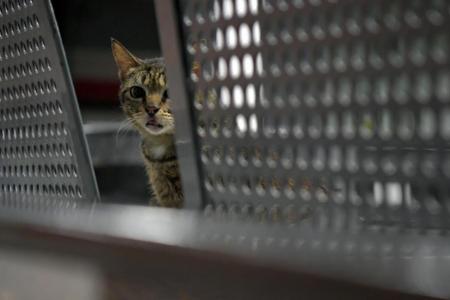Views: Time has come to let cats into flats
Success of pilot programme shows cats can be kept as pets in HDB flats
Some cat lovers and animal lovers were recently taken aback by the revelation that cats are prohibited as pets in HDB flats.
Judging from the reaction to a widely-circulated letter in which the Housing Board ordered a flat-owner to remove his pet cat, this is apparently a ruling that not many knew about.
Many asked, "If dogs are allowed in our HDB flats, why aren't cats?"
According to HDB's website: "Cats are not allowed in flats. They are generally difficult to contain within the flat. When allowed to roam indiscriminately, they tend to shed fur and defecate or urinate in public areas, and also make caterwauling sounds, which can inconvenience your neighbours."
Although a blanket ban seems harsh, there is some truth to the reasons given for the banning of cats in public housing estates.
As solitary creatures, cats are difficult to contain within the flat given their independent streak and penchant for wandering.
However, when it comes to issues of shedding, defecating and urinating in public spaces, cat lovers have some grounds for feeling unjustly targeted. The logic seems lacking when dogs are prone to the same behaviour.
Dogs, like cats, shed fur. As for defecating and urinating, cats actually have a habit of covering up their excrement as this masks their tracks in the wild and hides their unique scents from would-be predators.
As it stands, the ban is not actively enforced and the authorities act only when a complaint is made against a HDB cat owner. When that happens, chances are that the cat will have to be rehomed.
On the contrary, dogs are commonly seen to defecate and simply walk away. Yet despite this, there isn't a blanket ban on dogs in HDB flats.
Instead, responsible ownership is encouraged, where dog owners are actively educated to clean up after their pets.
In this case, why can't the same solution be extended to cat lovers?
It could take some work, but there are many steps responsible cat owners can take to prevent their pets from wandering from home and inconveniencing others, such as installing wire mesh at the gates and windows and keeping a closer eye on the curious kitty.
As an animal lover, I'm for removing the ban on cats. I think it's time for the authorities as well as the community to relook this archaic regulation.
The authorities have already shown they are open to softening their stance on the issue.
PILOT PROGRAMME
A pilot programme in Chong Pang, dubbed Love Cats, was launched in 2012 to allow flat dwellers to keep cats as long as they are registered, sterilised, microchipped and kept indoors.
Four years on, the programme, spearheaded by Cat Welfare Society (CWS), has 105 registered households, and talks are underway for the scheme to expand to other neighbourhoods, which is on hold only for the lack of funds.
With the advocacy of animal welfare groups like CWS, cat owners can take steps to better look after their pets and avoid inconveniencing their neighbours.
These may include confining the cats indoors and toilet-training them.
As it stands, the ban is not actively enforced and the authorities act only when a complaint is made against a HDB cat owner. When that happens, chances are that the cat will have to be rehomed.
Instead of complaining to the authorities whenever we encounter an errant cat, why not just have a chat with its owner?
Cat owners would appreciate having an honest conversation that comes across as a friendly reminder to keep their pets in check.
On the other side of the fence, having a pet comes with great responsibilities.
I keep a close eye on my cat if he roams outside. None of my neighbours knew about my cat until they saw my cat in a carrier on the way to the vet.
Our neighbourhoods are communal spaces. Some residents are animal lovers, others may not be. Living in a community, it is important that we respect the differences among us.
If someone can make the effort to initiate a chat about an animal being a nuisance, the least the pet owner can do is be sensitive to his or her neighbour's concerns.
In time, pet owners can learn to be mindful of their neighbours' needs and non-owners can learn to appreciate their neighbours' pets. They could even teach us a thing or two about being human.
If we allow 62 breeds of dogs in HDB flats, we should allow cats as well.
There is only so much regulations can do to ensure neighbourly peace, so why not leave it to residents to figure out what works for them?
Or has the cat got our tongue?
Mr Noi Muhammad is Assistant General Secretary, Marketing Communications, Singapore Kindness Movement. This article was first published on The Pride (pride.kindness.sg).
Get The New Paper on your phone with the free TNP app. Download from the Apple App Store or Google Play Store now



